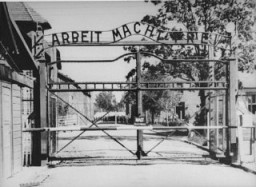You searched for: dachau
<< Previous | Displaying results 251-260 of 300 for "dachau" | Next >>
-
Abraham Lewent describes deportation to and conditions in Majdanek
Oral HistoryLike other Jews, the Lewents were confined to the Warsaw ghetto. In 1942, as Abraham hid in a crawl space, the Germans seized his mother and sisters in a raid. They perished. He was deployed for forced labor nearby, but escaped to return to his father in the ghetto. In 1943, the two were deported to Majdanek, where Abraham's father died. Abraham later was sent to Skarzysko, Buchenwald, Schlieben, Bisingen, and Dachau. US troops liberated Abraham as the Germans evacuated prisoners.
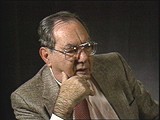
-
Abraham Lewent describes his father's death at Majdanek
Oral HistoryLike other Jews, the Lewents were confined to the Warsaw ghetto. In 1942, as Abraham hid in a crawl space, the Germans seized his mother and sisters in a raid. They perished. He was deployed for forced labor nearby, but escaped to return to his father in the ghetto. In 1943, the two were deported to Majdanek, where Abraham's father died. Abraham later was sent to Skarzysko, Buchenwald, Schlieben, Bisingen, and Dachau. US troops liberated Abraham as the Germans evacuated prisoners.
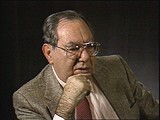
-
William (Bill) Lowenberg describes conditions in the Westerbork camp in the Netherlands
Oral HistoryAs a boy, Bill attended school in Burgsteinfurt, a German town near the Dutch border. After the Nazis came to power in Germany in January 1933, Bill experienced increasing antisemitism and was once attacked on his way to Hebrew school by a boy who threw a knife at him. In 1936, he and his family left Germany for the Netherlands, where they had relatives and thought they would be safe. However, after Germany invaded the Netherlands in May 1940, antisemitic legislation--including the order to wear the Jewish…
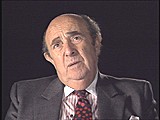
-
William (Bill) Lowenberg describes deportations from the Westerbork camp in the Netherlands
Oral HistoryAs a boy, Bill attended school in Burgsteinfurt, a German town near the Dutch border. After the Nazis came to power in Germany in January 1933, Bill experienced increasing antisemitism and was once attacked on his way to Hebrew school by a boy who threw a knife at him. In 1936, he and his family left Germany for the Netherlands, where they had relatives and thought they would be safe. However, after Germany invaded the Netherlands in May 1940, antisemitic legislation—including the order to wear the…
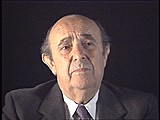
-
David (Dudi) Bergman describes liberation by US Army in mountains near Innsbruck
Oral HistoryThe Germans occupied David's town, previously annexed by Hungary, in 1944. David was deported to Auschwitz and, with his father, transported to Plaszow. David was sent to the Gross-Rosen camp and to Reichenbach. He was then among three of 150 in a cattle car who survived transportation to Dachau. He was liberated after a death march from Innsbruck toward the front line of combat between US and German troops.
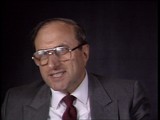
-
William Denson describes counsel provided to accused war criminals
Oral HistoryWilliam Denson graduated from the US Military Academy at West Point in 1934 and attended Harvard Law School. He returned to West Point to teach law from 1942 until 1945. In January 1945, Denson accepted the position of Judge Advocate General (JAG) in Europe and was assigned to US Third Army headquarters in Germany. He took part in more than 90 trials against Germans who had committed atrocities against downed American pilots. In August 1945, Denson became chief prosecutor for the US government at the…
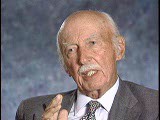
-
William Denson describes finding witnesses for the postwar trials of concentration camp personnel
Oral HistoryWilliam Denson graduated from the US Military Academy at West Point in 1934 and attended Harvard Law School. He returned to West Point to teach law from 1942 until 1945. In January 1945, Denson accepted the position of Judge Advocate General (JAG) in Europe and was assigned to US Third Army headquarters in Germany. He took part in more than 90 trials against Germans who had committed atrocities against downed American pilots. In August 1945, Denson became chief prosecutor for the US government at the…
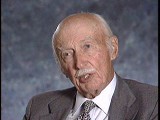
-
Abraham Klausner describes postwar efforts to reunite survivors
Oral HistoryRabbi Abraham Klausner was a US Army military chaplain. He arrived in the Dachau concentration camp in May 1945. He was attached to the 116th evacuation hospital unit and worked for about five years in displaced persons camps, assisting Jewish survivors.
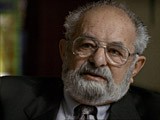
-
Elie Wiesel Timeline and World Events: 1928–1951
ArticleSurvivor Elie Wiesel devoted his life to educating the world about the Holocaust. Learn about key events in the world and his life from 1928–1951.
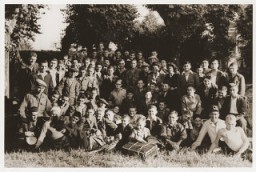
-
Auschwitz: Key Dates
ArticleExplore a timeline of key events in the history of the Auschwitz camp complex in German-occupied Poland.
